The iconic theme song of Aeris is undoubtedly one of the most memorable in Final Fantasy VII, partly due to its powerful and melancholic chord progression, and partly due to the heart-wrenching scene at which it most infamously plays. It is a somber and beautiful piece of music with a reputation as a staple in Final Fantasy concerts, arrangements, and medleys. But more than that, it also holds a position as a love song.

Square Enix’s official music channel included “Aerith’s Theme” on their 2021 Valentine’s Day playlist (right after Suteki da Ne from Final Fantasy X!) The playlist is featured both on Spotify and their YouTube channel. “Aerith’s Theme” is the song from Final Fantasy VII included.
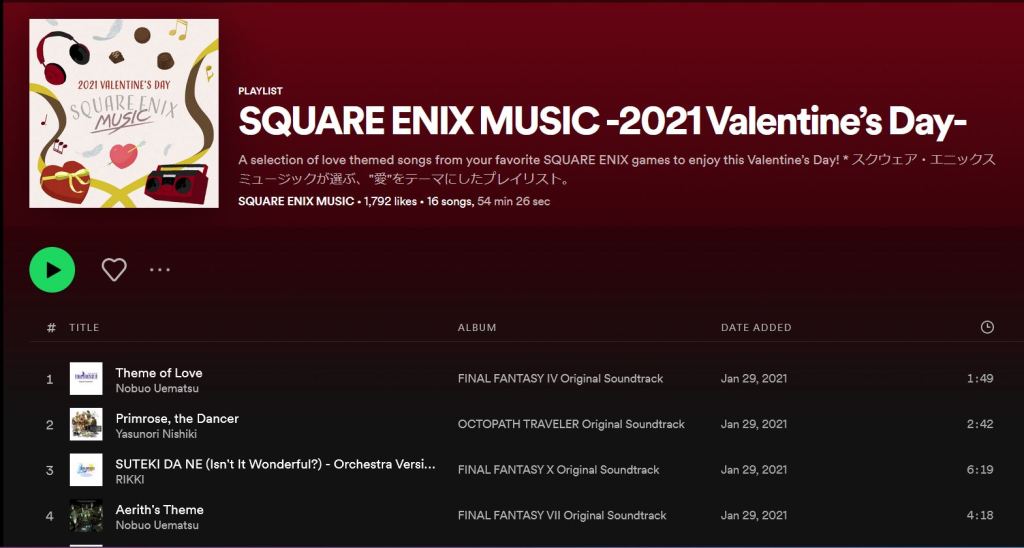
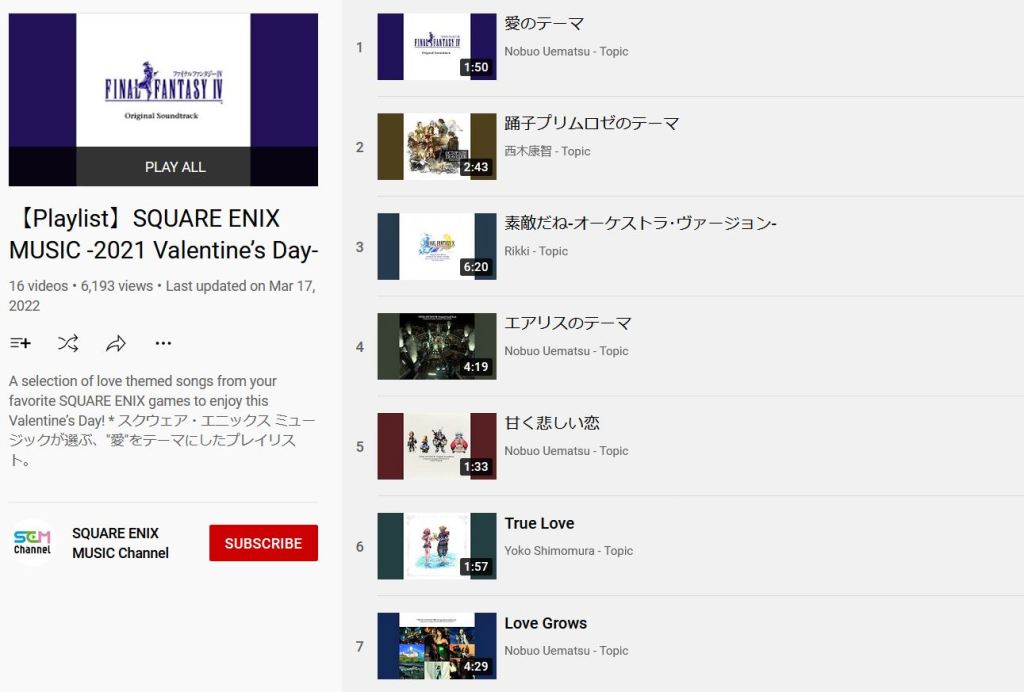
At first, that might be surprising. Is Aeris’s theme really a love song?
The theme first plays in Final Fantasy VII when Aeris’s adoptive mother, Elmyra, relays the bittersweet story of how she became the last Cetra’s guardian: fifteen years ago, Elmyra waited at the train station every day for her husband to return from the war in Wutai, but he never returned. But one day, she found the mortally wounded Ifalna and the young Aeris, and promised the dying mother that she would care for her daughter. Thus, Ifalna found some happiness in her grieving, but Aeris came with strange troubles: she was an escaped prisoner wanted by Shinra for scientific experiments, and Aeris’s strange powers led to painful moments – such as when she told Elmyra she felt her dead husband’s spirit come to bid his wife farewell.

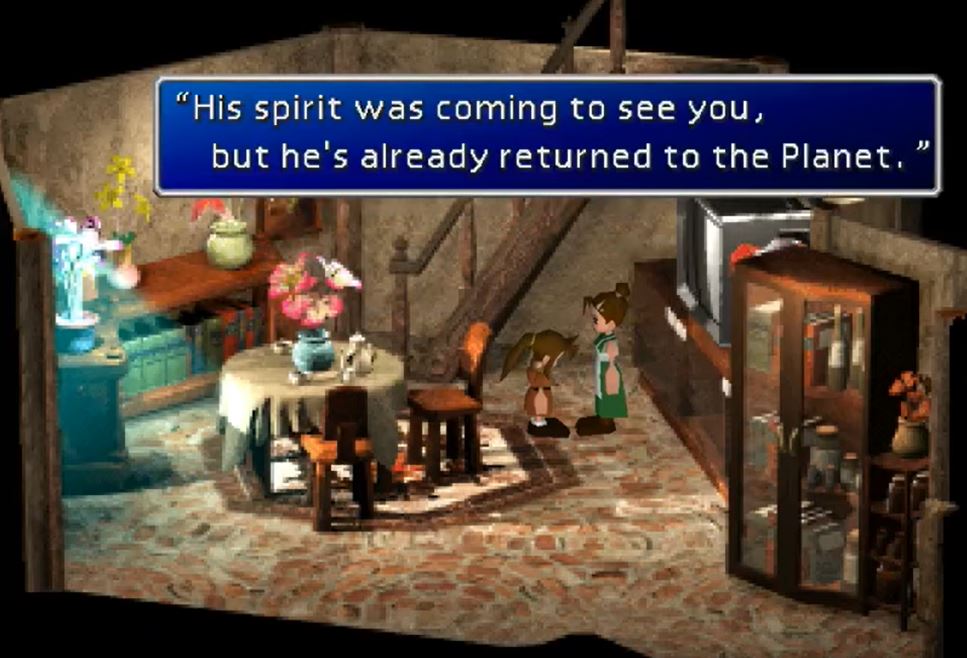
The theme plays again at the most devastating moment in the game: when Aeris herself is murdered by Sephiroth. We watch Sephiroth’s sword plunge through Aeris silently, her body lurching and the ribbon in her hair unraveling. The materia it concealed drops to the ground, and as it bounces, the first measures and most recognizable motif of Aeris’s theme starts to play. The party then is forced to battle JENOVA to the song, and then watch Cloud’s unbearable grief as he processes her loss and offers a tragic farewell.


With these two moments, “loss” does seem to be a more apparent association with the song. Elmyra loses her husband, Aeris loses her mother, and finally, Cloud loses Aeris. But loss only hurts when it is founded in love. Grief, in that way, is just an expression of love.
Final Fantasy composer Nobuo Uematsu didn’t write Aeris’s theme with death in mind. Instead, he was simply writing a theme for the scene where Elmyra waits for her husband at the train station.
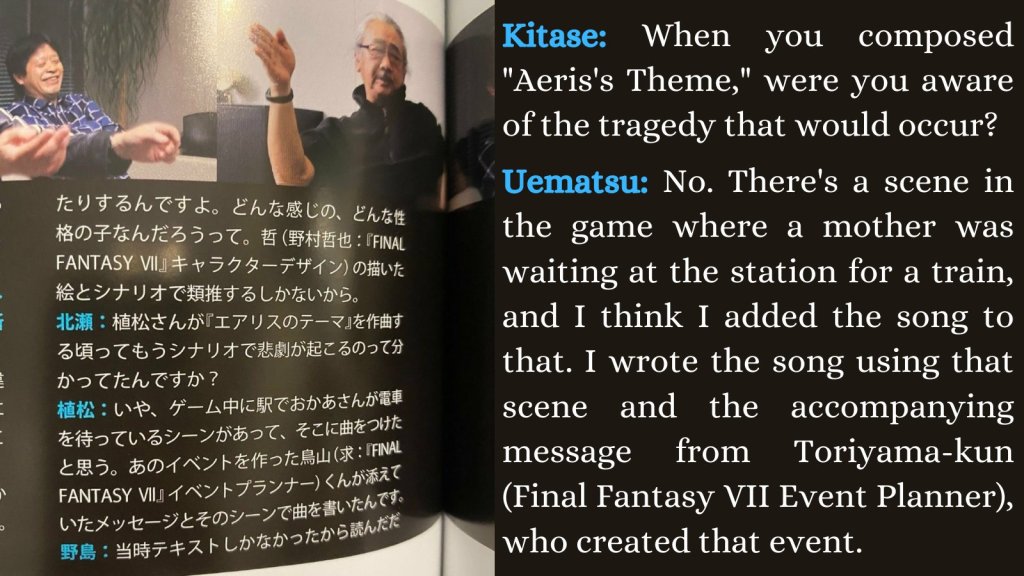
Kitase: When you composed “Aeris’s Theme,” were you aware of the tragedy that would occur?
Uematsu: No. There’s a scene in the game where a mother was waiting at the station for a train, and I think I added the song to that. I wrote the song using that scene and the accompanying message from Toriyama (Final Fantasy VII Event Planner), who created that event.
The concept of “waiting for a train to arrive returning your loved one” is poignant. In this sense, “Aerith’s Theme” is also Elmyra’s theme. Elmyra waits for her husband to return but he never does. We might imagine Aeris also waiting hopefully for her first love Zack to return to Midgar, but he never does, either. Then Cloud hopes Aeris will return after she says “I’ll come back when it’s all over” – but she doesn’t.
The idea of “waiting for a lost love” might also explain why Uematsu seemed inspired by one of his previous pieces: the “Aria di Mezzo Carattere” from Final Fantasy VI. During an opera, one of the game’s protagonists, Celes, plays the heroine Maria, who was parted against her will from the man she loves, and is currently being forced to marry an evil prince. Listen to the piece below – can you hear elements of Aeris’s theme?
But Aeris’s theme is more than just loss. The softer, more relaxed arrangement of her theme, “Flowers Blooming in the Church,” is used at Cloud and Aeris’s second meeting once he falls into her flowerbed, and the two share friendly, flirty conversation that ends in Cloud agreeing to be her bodyguard in exchange for one date. This version plays again at Aeris’s house, where she leads Cloud to spend the night, and he recognizes feeling at home and even dreams of his mother recommending that he date a girl with a personality just like Aeris’s.
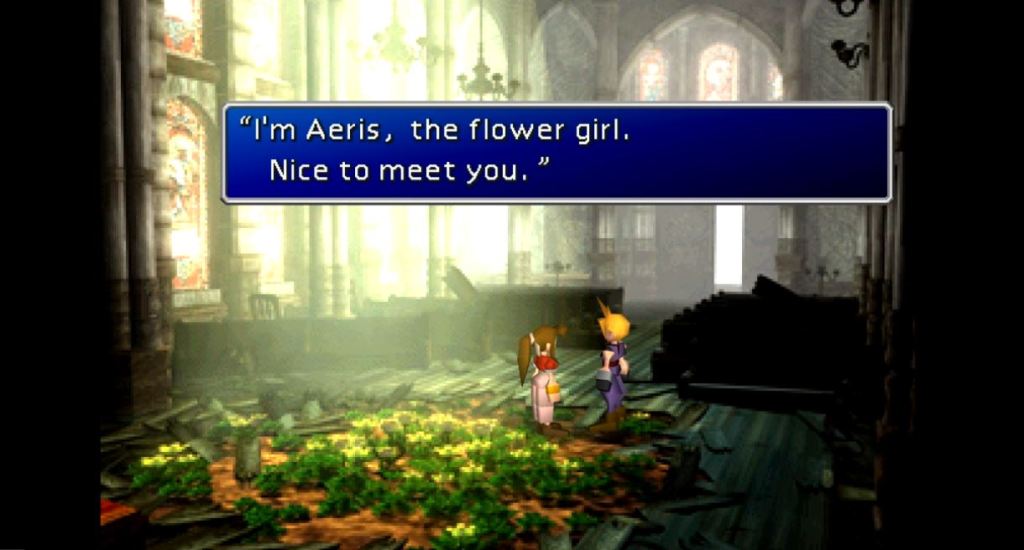
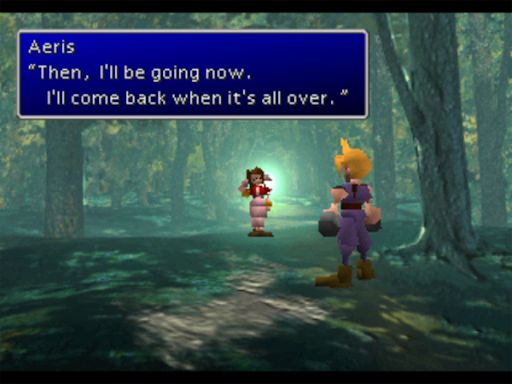
“Flowers Blooming in the Church” plays when Aeris visits Cloud dream upon departing from the party, with her meaningful final line, “I’ll come back when it’s all over.” It plays after her death once again, when Cloud returns to the Forgotten City with the sage Bugenhagen and uncovers Aeris’s secret mission to pray for Holy, a magical force that may protect them from impending doom. And finally, this version continues to play in the slums church itself, including when Cloud momentarily sees Aeris’s ghost tending to the flowers.
Final Fantasy VII Remake turns “Flowers Blooming in the Church” into a full orchestral piece. Describing its musical qualities, the song is described as “romantic.”
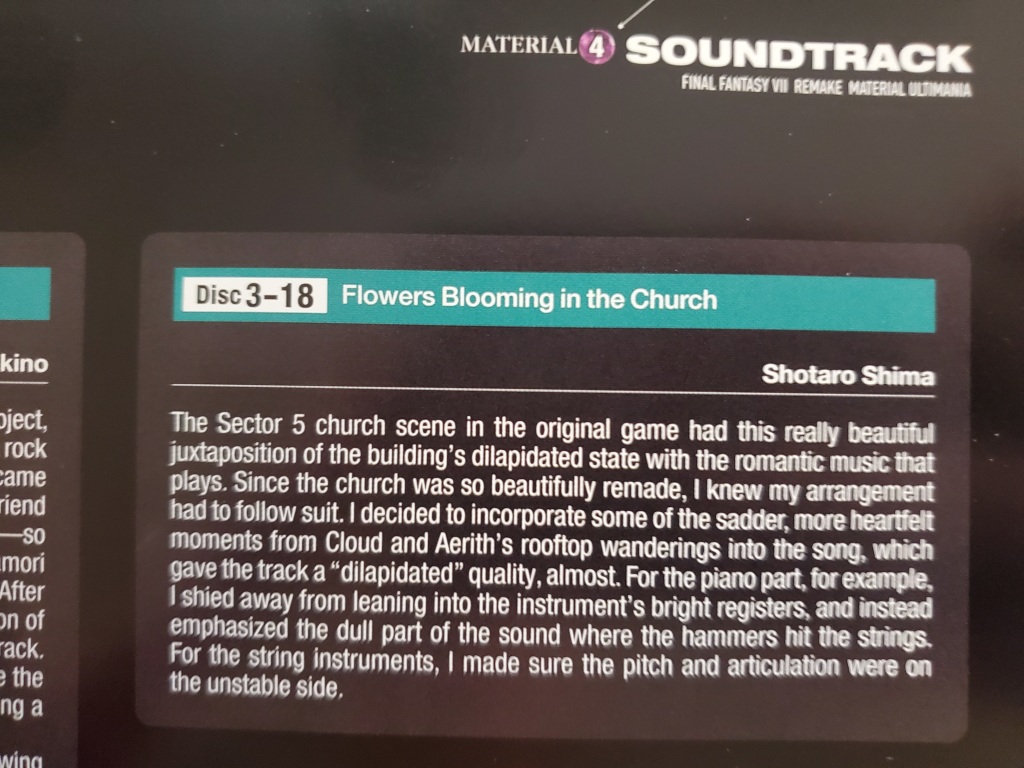
Flowers Blooming in the Church
Shotaro Shima, Final Fantasy VII Remake Material Ultimania
The Sector 5 church scene in the original game had this really beautiful juxtaposition of the building’s dilapidated state with the romantic music that plays. Since the church was so beautifully remade, I knew my arrangement had to follow suit. I decided to incorporate some of the sadder, more heartfelt moments from Cloud and Aerith’s rooftop wanderings into the song..
In Final Fantasy VII Remake, Aeris’s theme is explored and re-imagined for a few pieces, but the feeling of “home” is presented in a new variation called “Aerith’s Theme – Home Again.” This replaces “Flowers Blooming in the Church” for the scenes in Aeris’s house, and instead of the mystical romance of the first, this new piece seeks to emphasize the warm atmosphere that Cloud, who hasn’t had a home of his own in many years, is invited into.
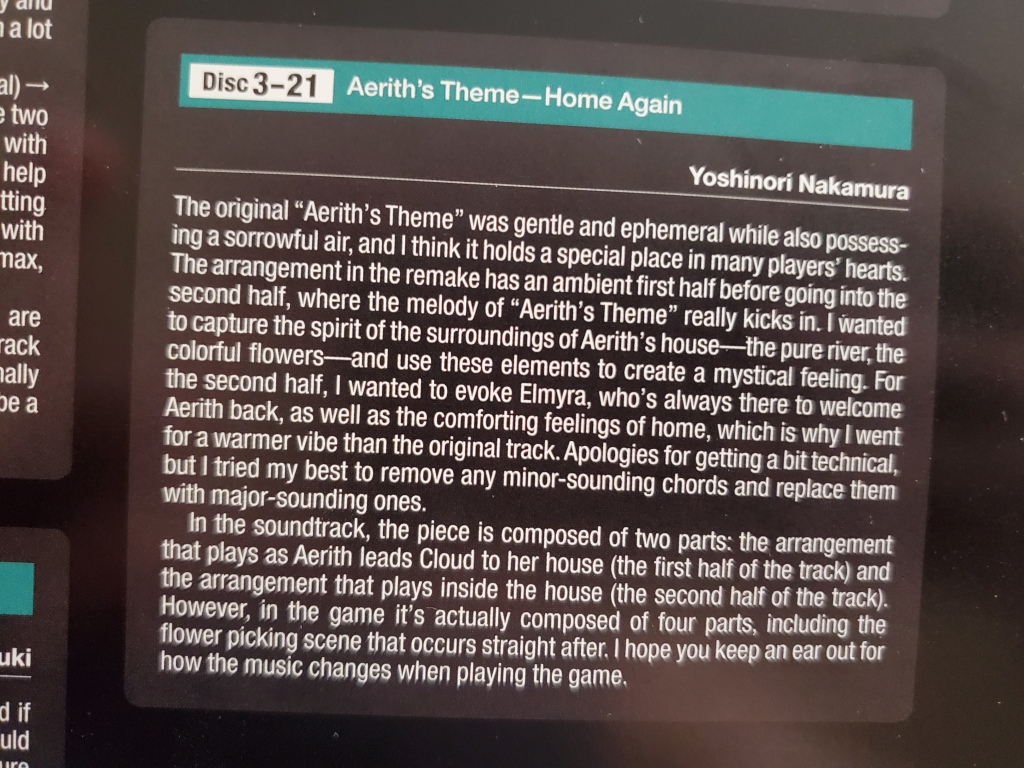
Aerith’s Theme – Home Again
Yoshinori Nakamura, Final Fantasy VII Remake Material Ultimania
The original “Aerith’s Theme” was gentle and ephemeral while also possessing a sorrowful air, and I think it holds a special place in many players’ hearts. […] I wanted to capture the spirit of the surroundings of Aerith’s house – the pure river, the colorful flowers – and use these elements to create a mystical feeling. For the second half, I wanted to evoke Elmyra, who’s always there to welcome Aerith back, as well as the comforting feelings of home…
So too does Elmyra’s story with Aeris get musical recognition: the mother-and-daughter found one another through their own loss. “Aeris’s Theme”, which played so hauntingly at their meeting, is morphed into a song of home.
In Final Fantasy VII, Aeris’s iconic motif (F♯-A-D / C♮-A-E) also plays in the game’s ending. Its notes are heard when Cloud is tunneling through a wormhole to confront Sephiroth’s spirit, as though suggesting Aeris is guiding him. It plays again when Cloud has defeated Sephiroth in the Northern Cave, and is engulfed in the Lifestream – only to see a familiar hand reaching from him above. Cloud extends his hand to Aeris, almost grasping her before the vision is disrupted. He then tells Tifa that he believes he can meet Aeris once again in the Promised Land.

This ending amends Aeris’s theme to mean something much more profound than than loss. It’s about a comforting presence and cherished memories. It’s about a feeling of home and a quiet peace in a chaotic world. And finally, it’s about the promise of a reunion – whether in this world, or another.
That sentiment of a love beyond death is tied to Elmyra, who grieved the husband that never returned to her – only for Aeris to tell her that his spirit returned to her, and the dead aren’t gone, anyway – they are always with us as part of the Planet. It’s tied to Aeris, who lost her mother, but is comforted that her mother is still with her in an important way. And finally, to Cloud, who lost Aeris, but comes to understand that the “Promised Land” represents a way to one day meet again.
Perhaps the concept love surmounting loss is exactly what makes Aeris’s theme the perfect love song. Nobuo Uematsu has taken note:
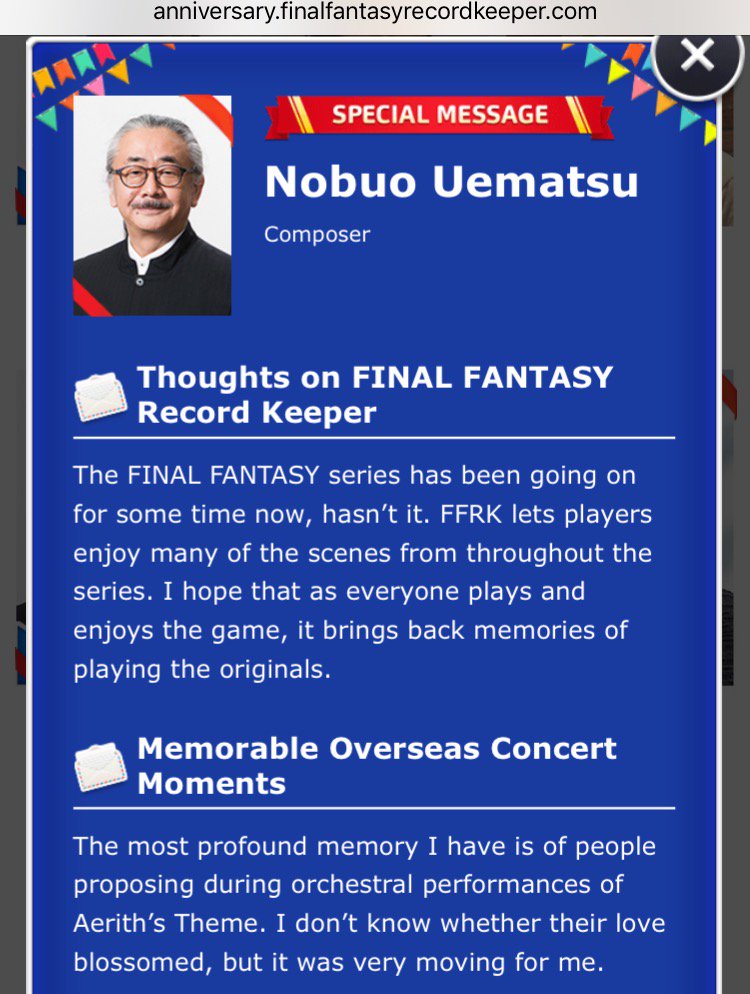
Memorable Overseas Concert Moments
The most profound memory I have is of people proposing during the orchestral performances of Aerith’s Theme. I don’t know whether their love blossomed, but it was very moving for me.
Nobuo Uematsu, Final Fantasy Record Keeper Anniversary interview
One such couple that made the news was from Seth Hay, who made the news with his Clerith-themed proposal at a Distant Worlds concert in Toronto. Apparently, Square Enix agreed to help make his proposal extra special – and played a video during Aerith’s Theme of Cloud and Aeris’s church reunion, with a special text box reading, “Would you do me the honor of marrying me?” (Seth uploaded the video file onto YouTube, which you can watch below!)
Fans have also used “Aerith’s theme” in their wedding ceremonies, whether to walk own the aisle or as the couple’s “first dance.” (Anecdotal, but an old friend of mine did the latter at her own wedding, with the video footage to prove it!)
And why not? Cloud and Aeris’s marriage, of course, was foretold by Cait Sith in the game itself. When Aeris asks Cait Sith to read their fortune in the Temple of the Ancients, Cait Sith exclaims, “Aeris’s star and Cloud’s star! They show a great future! Cloud, I’ll be your matchmaker, preacher… I’ll do whatever you want me to!”
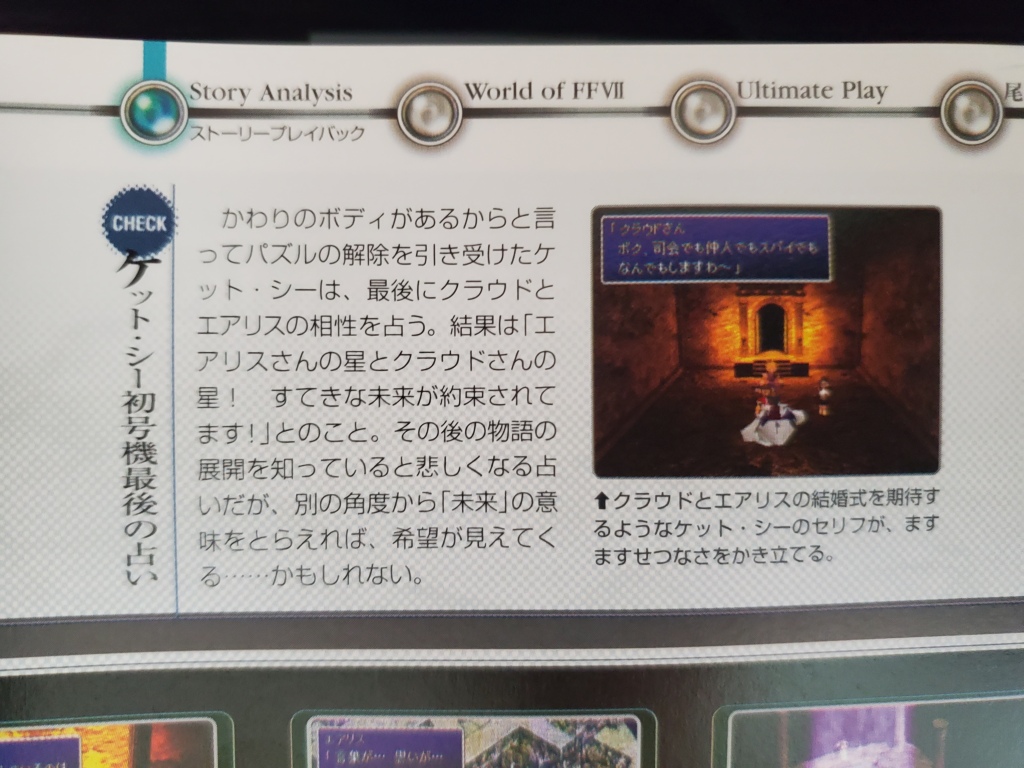
[Cait Sith] tells one last fortune about Cloud and Aerith’s compatibility. The result of it turns out as, “Aerith’s star and Cloud’s star! They show a great future!” Later, it will become a sad prediction when we get to know what happens afterward. But if we can consider the meaning of “future” from another angle, we can see hope.. perhaps.
(Image caption) Cait Sith’s lines which predict Cloud and Aerith’s wedding now becomes more painful.
Fan translation, Final Fantasy VII Ultimania Omega (page 151)
It’s a sad prediction, but Ultimania Omega says perhaps there’s hope. Remembering Aeris’s lesson of our loved ones always being with us, or perhaps Cloud’s wish of finding Aeris in the Promised Land, rather than a bad omen, using the song might in fact represent the most intimate and powerful declaration of love possible. Regardless of what the answer may be, Aeris is considered Cloud’s wedding match in Final Fantasy VII itself. And, of course, Cloud and Aerith’s wedding in Final Fantasy Brigade has inspired much appreciation from fans, as well.

So to all the couples who love Final Fantasy VII – Aeris’s theme song may just be the perfect romance song for you, whether on a Valentine’s Day or your wedding. It’s a beautiful way to honor Aeris or the love she shares with Cloud, and the perfect sentiment to share with the special people in your life.